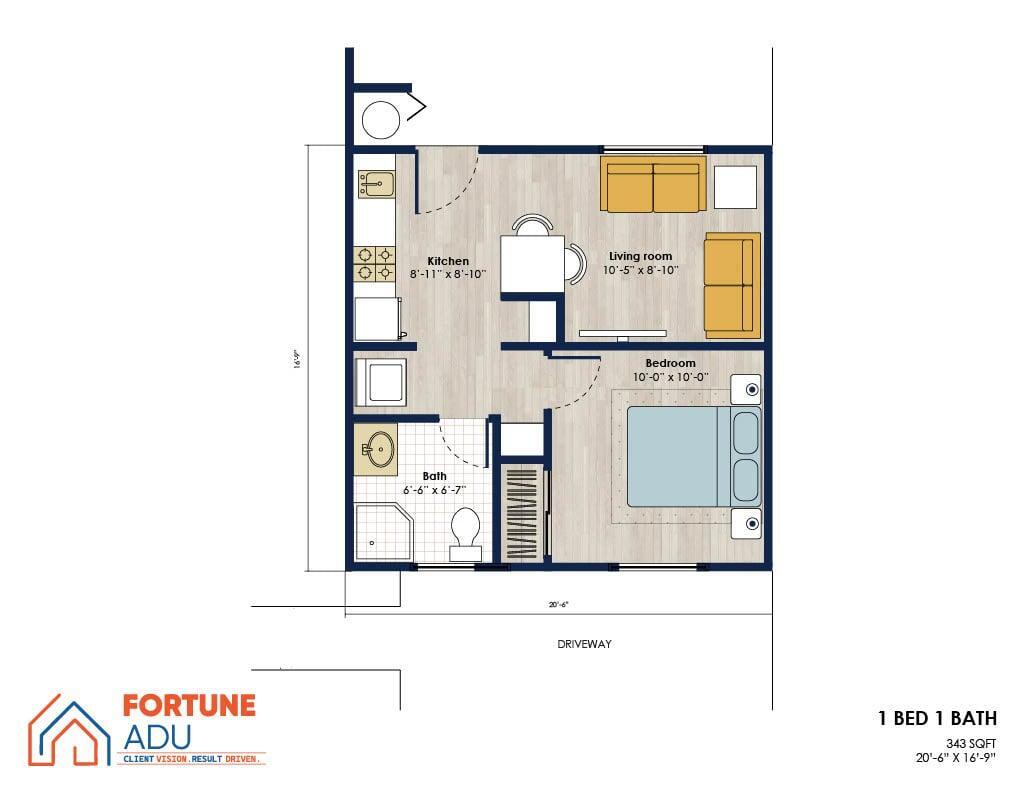
Thinking about building an ADU in San Diego? You're not alone. Whether it's for rental income, family, or a home office, accessory dwelling units are booming. But before you get too deep, there's a critical step to budget for: permits.
And guess what? They're not cheap—or simple. This guide breaks down what you’ll pay, where your money’s going, and how to avoid getting blindsided later in the process.
What Are ADU Permit Costs, Really?
Permit costs are fees charged by the city to review, process, and approve your project. These aren’t optional. Skip them and your build is illegal.
In San Diego, total permit costs usually land somewhere between $3,000 and $15,000.
Why the big range? Good question.
It depends on:
ADU size
Type (detached, attached, garage conversion, etc.)
Utility connections
Location
Scope of structural work
Let’s break it down, line by line.
Core City Fees
Every ADU triggers a series of baseline city fees.
1. Plan Check Fees
This is what you pay for the city to review your plans. It’s based on the construction value you report, not a flat rate. For most projects, expect $1,000–$3,000 here.
2. Building Permit Fee
This is the big one. It covers inspections and approvals during construction. For a detached ADU, the building permit often runs $2,000 to $6,000, depending on square footage.
3. Zoning Review Fee
Yes, even if you’re allowed to build an ADU, the city still needs to verify it complies with zoning. Expect about $400–$900.
Additional Permit-Related Costs
The city isn’t the only hand in your wallet.
4. School Impact Fees
These are charged by the local school district. In San Diego Unified, you’ll pay $4.79 per square foot over 750 sq ft. So if your ADU is 800 sq ft, you owe for 50 sq ft: $239.50.
Small ADUs (under 750 sq ft) are exempt.
5. Development Impact Fees (DIF)
San Diego waives these for ADUs under 1,200 sq ft in single-family zones. But if you’re over that or in a multifamily setup, you could still see a bill.
Not every area is subject to DIFs. It’s case-by-case.
6. Water and Sewer Connection Fees
This is where things get murky.
If your ADU is detached, you might need new water/sewer connections. That could add $2,000–$6,000 depending on distance, trenching, and site access.
Conversions or attached ADUs often avoid this.
Design-Related Costs (Still Part of the Permit Phase)
Not technically "fees," but you can’t pull a permit without them.
7. Title 24 Energy Reports
California requires proof your ADU meets energy efficiency standards. A certified consultant usually charges $300–$500 for this report.
8. Structural Calculations
If you're adding square footage or altering rooflines, you’ll need these. Expect $800–$2,000 depending on complexity.
9. Soil Reports (Sometimes)
In hillside areas or properties with known geotech concerns, the city may require a soil report. That’s another $2,000–$4,000.
Permits vs. Plans: Know the Difference
Let’s clear something up: plans are not permits.
You’ll pay separately for:
ADU design (architect or design-build)
Structural drafting
3D renderings (if needed)
Site plans
Depending on who you hire and what services they include, design can cost $5,000 to $15,000. That’s before the city ever sees your plans.
Some companies offer permit-ready sets or even pre-approved ADUs. These can reduce time and cost—sometimes by thousands.

What If You Use San Diego’s Pre-Approved ADU Plans?
San Diego offers a library of pre-approved floor plans to cut red tape.
You still need:
Site plan
Structural foundation info
Utility layout
But you skip the full plan check, which can knock $1,000–$2,500 off the total. It's not plug-and-play, but it’s close.
One caveat: These plans are basic. No custom finishes, no wild layouts. If you want something tailored to your lot or lifestyle, pre-approved isn’t always the best fit.
Timeline: How Long Does the Permit Process Take?
On average: 2–4 months.
If you’re fast with paperwork and your plans are clean, you might clear it in 6–8 weeks. If the city wants revisions, add another month or more.
Here’s a rough order of operations:
Submit plans
Wait for plan check feedback
Make corrections
Resubmit
Approval and permit issuance
Having an experienced designer or design-build team smooths this out. They know what the city wants—and what slows things down.
Cost-Saving Tips
Let’s be honest: this stuff adds up. Here’s how you keep your costs lean:
1. Stay Under 750 Sq Ft
Avoid school fees. Possibly water/sewer too. And you still get plenty of usable space.
2. Go Attached or Convert Existing Space
Garage conversions are a gold mine. You skip foundation work, often keep utility connections, and cut design fees.
3. Reuse Plans
If your neighbor built one and you like the layout—reuse it. It’s legal, as long as the drafter allows it.
4. Work With People Who Know the System
Seriously. Half the delays we see are from DIYers or architects unfamiliar with local codes.
Final Cost Example
Let’s say you're building a 600 sq ft detached ADU in Clairemont.
Plan check: $1,200
Building permit: $2,800
Zoning review: $600
Water/sewer (no new lines): $0
School fees: Exempt
Title 24: $400
Structural calc: $1,000
Total: $6,000–$7,000, not including design.
This is typical for a straightforward build. If you’re building a 1,200 sq ft guest house in La Jolla on a slope? You’re looking at $12,000+ in permits alone.
So, Is It Worth It?
Short answer: Usually, yes.
Renting a one-bed ADU in San Diego easily nets $2,000–$2,500/month. That’s $30K a year on a structure that cost $180K to build. Not bad.
And if it adds $150K–$250K in property value? Even better.
Just don’t walk in blind. Permits matter. Budget for them early, and work with a team that knows how to handle them right the first time.
Final Thoughts
Permitting in San Diego isn’t the wild west anymore—but it’s still tricky. Rules change. Forms change. Fees get updated.
But if you go in with eyes open and the right partners, your ADU build won’t just be possible—it’ll be profitable.
Questions? Concerns? You’re not the only one. Building an ADU is a big move. Just make sure the permits don’t catch you by surprise.

